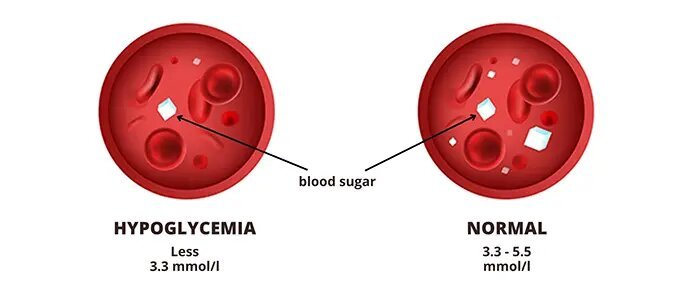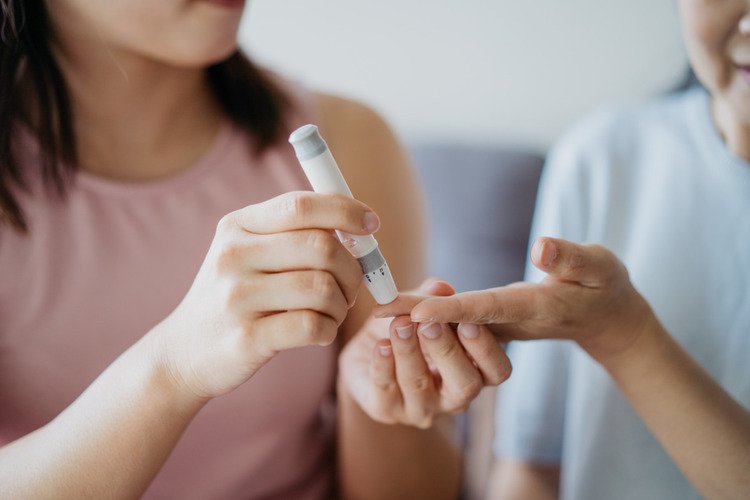Low blood sugar — commonly known as hypoglycemia — is often linked with diabetes. But what if you experience low blood sugar without being diabetic? Feeling shaky, dizzy, fatigued, or confused without having diabetes can be both confusing and concerning. So, what causes low blood sugar without diabetes?
This condition, known as non-diabetic hypoglycemia, affects many people. It can occur due to dietary habits, lifestyle choices, hormonal imbalances, or underlying health conditions. In this comprehensive blog, we’ll explore everything you need to know — from the causes and symptoms to how you can prevent and manage it.
What Is Hypoglycemia?

Hypoglycemia refers to an abnormally low level of glucose (sugar) in the blood. Glucose is the body’s main source of energy, and it’s especially crucial for the brain. When your blood sugar drops below 70 mg/dL, you may begin to feel a range of uncomfortable — and even dangerous — symptoms.
People with diabetes are most commonly affected due to insulin use or medications. However, non-diabetic individuals can also experience hypoglycemia, and this often goes undiagnosed or misunderstood.
What Causes Low Blood Sugar Without Diabetes?
Several factors can trigger low blood sugar in non-diabetics. Let’s explore them one by one:
1. Reactive Hypoglycemia (Postprandial Hypoglycemia)
This occurs 2 to 4 hours after eating, especially meals that are high in carbohydrates or sugar. It’s one of the most common causes of low blood sugar without diabetes. Learn more about reactive hypoglycemia
Why it happens:
- You eat a carb-rich meal.
- Your pancreas releases insulin to process the sugar.
- Too much insulin causes your blood sugar to drop too low.
Common triggers:
- White bread, sugary cereals, soda
- Skipping protein and fiber
- Eating large portions of simple carbs
How to prevent it:
- Eat balanced meals (protein + fiber + complex carbs)
- Avoid sugar binges or skipping meals
- Monitor your body’s response after meals
2. Fasting Hypoglycemia
This form of hypoglycemia can happen when you go for extended periods without food or if you fast for religious, health, or weight loss reasons.
Why it happens:
- Without food, your body uses stored glucose.
- Once it runs out, your blood sugar starts to fall.
- Your liver may not release glucose fast enough, leading to hypoglycemia.
Risk factors:
- Skipping breakfast
- Intense workouts without fuel
- Intermittent fasting without medical guidance
Prevention:
- Don’t skip meals.
- Avoid excessive fasting, especially if you feel weak or irritable.
- Eat a small snack before physical activity.
3. Alcohol-Induced Hypoglycemia
Did you know alcohol can cause blood sugar crashes? This happens because alcohol interferes with the liver’s ability to release glucose.
Why alcohol causes low blood sugar:
- The liver focuses on metabolizing alcohol.
- It stops producing glucose to stabilize your blood sugar.
- Drinking on an empty stomach worsens the effect.
Especially risky:
- Drinking after long workouts
- Binge drinking
- Drinking without eating
Prevention:
- Always eat when you drink.
- Avoid alcohol-heavy nights if you’re prone to crashes.
4. Hormonal Imbalances
Certain hormonal disorders can affect the body’s ability to regulate blood sugar, even without diabetes.
Common hormonal causes:
- Adrenal insufficiency (Addison’s disease)
- Pituitary gland disorders
- Low cortisol or growth hormone levels
These conditions are rare but serious. They may cause chronic low blood sugar episodes that persist even with proper diet.
Signs you may have a hormone-related issue:
- Chronic fatigue
- Weight loss
- Salt cravings
- Low blood pressure
What to do:
- See an endocrinologist for hormone testing.
- Blood tests can help diagnose underlying imbalances.
5. Medications That Lower Blood Sugar
Even if you don’t have diabetes, certain prescription or over-the-counter medications may lower your blood sugar as a side effect.
Common culprits:
- Quinine (used for malaria)
- Beta-blockers (heart meds)
- Certain antibiotics
- Salicylates (aspirin in high doses)
Prevention:
- Discuss side effects with your doctor.
- Don’t stop meds abruptly — always consult first.
- Report any dizziness, shakiness, or sweating right away.
6. Rare Tumors (Insulinomas)
Though extremely rare, a tumor called an insulinoma (usually in the pancreas) can cause excess insulin production, which leads to low blood sugar.
Warning signs:
- Frequent fainting
- Seizures
- Confusion
- Episodes happen even after eating
These tumors are usually benign and can be treated surgically.
Symptoms of Low Blood Sugar in Non-Diabetics
Recognizing early signs of low blood sugar is crucial. Symptoms can range from mild to severe, and they often escalate if ignored.
Common early signs:
- Shakiness
- Dizziness or lightheadedness
- Sweating
- Fatigue or weakness
- Hunger
- Fast heartbeat
- Blurred vision
Severe symptoms:
- Confusion or irritability
- Difficulty speaking
- Fainting
- Seizures
- Loss of consciousness
How to Prevent Low Blood Sugar Without Diabetes
If you’re frequently dealing with hypoglycemia symptoms and don’t have diabetes, here are ways to stabilize your blood sugar:
1. Eat Small, Frequent Meals
Avoid large gaps between meals. Every 3–4 hours, eat something balanced.
2. Balance Your Macronutrients
Each meal should include:
- Protein (chicken, eggs, legumes)
- Complex carbs (brown rice, oats, quinoa)
- Healthy fats (avocados, nuts, olive oil)
3. Limit Simple Sugars
Avoid high-sugar snacks and drinks that cause blood sugar spikes, followed by crashes.
4. Exercise Smart
Don’t work out on an empty stomach. Always fuel up with a light snack beforehand.
5. Carry Emergency Snacks
If you’re prone to dips, keep granola bars, nuts, or dried fruit in your bag to recover quickly.
6. Avoid Excessive Alcohol
If you drink, do so with food. Avoid drinking after long fasts or intense physical activity.
When to See a Doctor
If you’re experiencing recurring symptoms of low blood sugar without diabetes, you should talk to a healthcare provider.
Your doctor may:
- Order fasting glucose tests
- Recommend a glucose tolerance test
- Check hormone levels
- Review your medication list
In rare cases, they may refer you for imaging tests to rule out insulinomas or liver/kidney problems.
Final Thoughts
So, what causes low blood sugar without diabetes?
The answer varies — from your diet and lifestyle to hidden health issues and medications. While some causes are mild and manageable, others may require medical attention.
If you’re dealing with persistent low blood sugar episodes, don’t ignore them. Proper diagnosis and small changes in your habits can significantly improve your energy, focus, and quality of life.
Stay informed. Eat balanced. Listen to your body.
And always remember: Not having diabetes doesn’t mean you’re immune to blood sugar issues. Knowing your triggers and managing them early can help you stay ahead of the curve.



